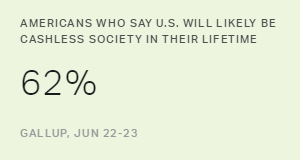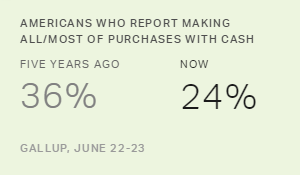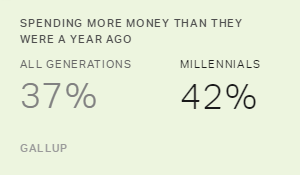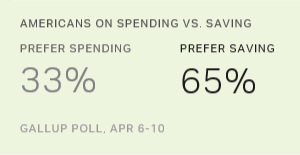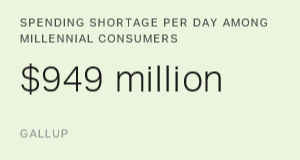Story Highlights
- 62% think society is likely to become cashless
- Older Americans prefer to always have cash on hand
- People in their peak earning years like to carry the most cash
WASHINGTON, D.C. -- Most Americans (62%) expect the U.S. to become a cashless society in their lifetime, with all purchases being made with credit cards, debit cards and other forms of electronic payment. They express these views as more Americans make payments from an expanding menu of electronic options, and fewer make cash transactions, and as younger populations are becoming more comfortable without cash in their pockets.
| Jun 22-23, 2016 | |||||||||||||||||||||||||||||||||||||||||||||||||||||||||||||||||||||||||||||||||||||||||||||||||||
|---|---|---|---|---|---|---|---|---|---|---|---|---|---|---|---|---|---|---|---|---|---|---|---|---|---|---|---|---|---|---|---|---|---|---|---|---|---|---|---|---|---|---|---|---|---|---|---|---|---|---|---|---|---|---|---|---|---|---|---|---|---|---|---|---|---|---|---|---|---|---|---|---|---|---|---|---|---|---|---|---|---|---|---|---|---|---|---|---|---|---|---|---|---|---|---|---|---|---|---|
| % | |||||||||||||||||||||||||||||||||||||||||||||||||||||||||||||||||||||||||||||||||||||||||||||||||||
| Very likely | 30 | ||||||||||||||||||||||||||||||||||||||||||||||||||||||||||||||||||||||||||||||||||||||||||||||||||
| Likely | 32 | ||||||||||||||||||||||||||||||||||||||||||||||||||||||||||||||||||||||||||||||||||||||||||||||||||
| Unlikely | 25 | ||||||||||||||||||||||||||||||||||||||||||||||||||||||||||||||||||||||||||||||||||||||||||||||||||
| Very unlikely | 11 | ||||||||||||||||||||||||||||||||||||||||||||||||||||||||||||||||||||||||||||||||||||||||||||||||||
| Gallup | |||||||||||||||||||||||||||||||||||||||||||||||||||||||||||||||||||||||||||||||||||||||||||||||||||
Gallup asked Americans in a June 22-23 survey about their opinions of cash and its future role in the economy. Solid majorities in all age groups say they can foresee a U.S. society without cash, including 58% of those 65 and older and 63% of 18- to 29-year-olds.
Younger Americans Least Likely to Have Cash on Hand
As Americans move away from using tangible currency for their transactions, the majority (54%) still say they like to have cash on them at all times. Forty-two percent say they are comfortable not having cash on them. Younger Americans between the ages of 18 and 29 are the most likely to be comfortable not having cash. Americans aged 30 and older -- including more than six in 10 among the oldest Americans -- say they would prefer having cash on them at all times, as opposed to not having cash.
| Have cash on you at all times | Comfortable not having cash | ||||||||||||||||||||||||||||||||||||||||||||||||||||||||||||||||||||||||||||||||||||||||||||||||||
|---|---|---|---|---|---|---|---|---|---|---|---|---|---|---|---|---|---|---|---|---|---|---|---|---|---|---|---|---|---|---|---|---|---|---|---|---|---|---|---|---|---|---|---|---|---|---|---|---|---|---|---|---|---|---|---|---|---|---|---|---|---|---|---|---|---|---|---|---|---|---|---|---|---|---|---|---|---|---|---|---|---|---|---|---|---|---|---|---|---|---|---|---|---|---|---|---|---|---|---|
| % | % | ||||||||||||||||||||||||||||||||||||||||||||||||||||||||||||||||||||||||||||||||||||||||||||||||||
| National adults | 54 | 42 | |||||||||||||||||||||||||||||||||||||||||||||||||||||||||||||||||||||||||||||||||||||||||||||||||
| 18 to 29 | 42 | 56 | |||||||||||||||||||||||||||||||||||||||||||||||||||||||||||||||||||||||||||||||||||||||||||||||||
| 30 to 49 | 54 | 42 | |||||||||||||||||||||||||||||||||||||||||||||||||||||||||||||||||||||||||||||||||||||||||||||||||
| 50 to 64 | 55 | 39 | |||||||||||||||||||||||||||||||||||||||||||||||||||||||||||||||||||||||||||||||||||||||||||||||||
| 65+ | 62 | 32 | |||||||||||||||||||||||||||||||||||||||||||||||||||||||||||||||||||||||||||||||||||||||||||||||||
| Gallup, June 22-23, 2016 | |||||||||||||||||||||||||||||||||||||||||||||||||||||||||||||||||||||||||||||||||||||||||||||||||||
Young adults' greater comfort in being cashless aligns with their self-reported behavior. They are using cash in a significantly smaller proportion of transactions than they were even five years ago, so they are clearly adapting to spending without cash.
Those in Peak Earning Years Carry the Most Cash
While older adults generally like to have cash always on hand, this does not mean they like to carry the most cash. Instead, those aged 30 to 49 like to have the most on hand, averaging $61.73. That is more than double the average amount of cash 18- to 29-year-olds like to carry.
| Mean | Median | ||||||||||||||||||||||||||||||||||||||||||||||||||||||||||||||||||||||||||||||||||||||||||||||||||
|---|---|---|---|---|---|---|---|---|---|---|---|---|---|---|---|---|---|---|---|---|---|---|---|---|---|---|---|---|---|---|---|---|---|---|---|---|---|---|---|---|---|---|---|---|---|---|---|---|---|---|---|---|---|---|---|---|---|---|---|---|---|---|---|---|---|---|---|---|---|---|---|---|---|---|---|---|---|---|---|---|---|---|---|---|---|---|---|---|---|---|---|---|---|---|---|---|---|---|---|
| $ | $ | ||||||||||||||||||||||||||||||||||||||||||||||||||||||||||||||||||||||||||||||||||||||||||||||||||
| National adults | 49 | 20 | |||||||||||||||||||||||||||||||||||||||||||||||||||||||||||||||||||||||||||||||||||||||||||||||||
| 18 to 29 | 27.25 | 0 | |||||||||||||||||||||||||||||||||||||||||||||||||||||||||||||||||||||||||||||||||||||||||||||||||
| 30 to 49 | 61.73 | 20 | |||||||||||||||||||||||||||||||||||||||||||||||||||||||||||||||||||||||||||||||||||||||||||||||||
| 50 to 64 | 48.04 | 20 | |||||||||||||||||||||||||||||||||||||||||||||||||||||||||||||||||||||||||||||||||||||||||||||||||
| 65+ | 52.30 | 25 | |||||||||||||||||||||||||||||||||||||||||||||||||||||||||||||||||||||||||||||||||||||||||||||||||
| Gallup, June 22-23, 2016 | |||||||||||||||||||||||||||||||||||||||||||||||||||||||||||||||||||||||||||||||||||||||||||||||||||
The ages of 30 to 49 are largely considered the peak earning years and the prime child-rearing years. Therefore, for those in this group, their relatively high amount of desired walking-around money may derive from both supply and demand -- they have access to more money, and they likely have more reasons to spend it.
Bottom Line
The first article in this two-part series reported on Americans' decreasing use of cash in daily transactions. Accordingly, most Americans can already foresee a time when cash will be obsolete.
Cash is becoming less a part of Americans' purchasing behavior as they gravitate toward other payment options and shift toward online purchases, rather than transactions in a brick-and-mortar store. Younger American customers' lower likelihood to use cash and greater comfort with not having it on hand suggest that the economy will have to adapt. This has significant implications for the credit card, banking and e-commerce industries as well as the local stores and businesses in every U.S. town and city. In the short term, this shift will place greater pressure on these businesses to adapt and accept electronic payments. In the long term, Americans largely predict that cash will become a relic.
Historical data are available in Gallup Analytics.
Survey Methods
Results for this Gallup poll are based on telephone interviews conducted June 22-23, 2016, with a random sample of 1,024 adults, aged 18 and older, living in all 50 U.S. states and the District of Columbia. For results based on the total sample of national adults, the margin of sampling error is ±4 percentage points at the 95% confidence level.
Each sample of national adults includes a minimum quota of 60% cellphone respondents and 40% landline respondents, with additional minimum quotas by time zone within region. Landline and cellular telephone numbers are selected using random-digit-dial methods.
View survey methodology, complete question responses and trends.
Learn more about how the Gallup Poll Social Series works.
